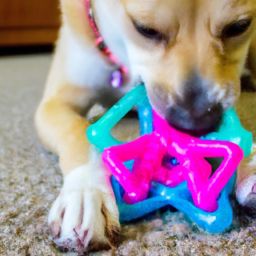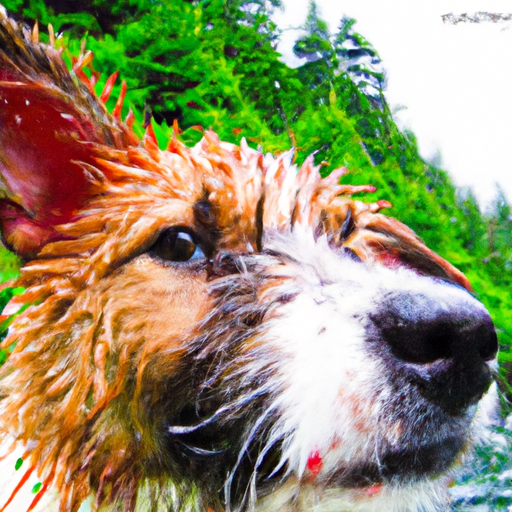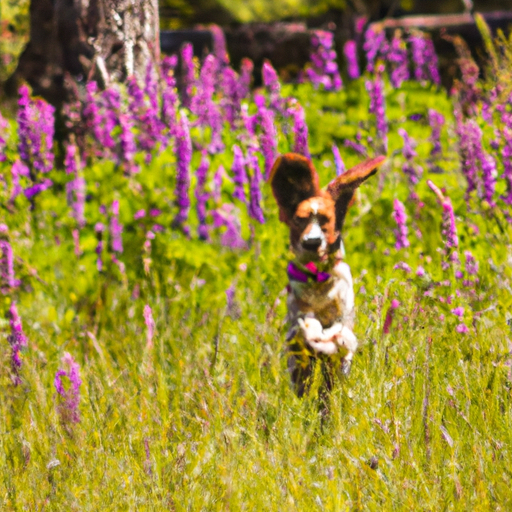Having a new puppy can be an exciting and joyful experience, but it can also come with its challenges. One of the most common concerns for new puppy owners is how to prevent destructive behavior in their adorable furry friend. Whether it's chewing on furniture, digging up the backyard, or constantly barking, these behaviors can be frustrating and even costly. But fear not, because with the right approach and a little patience, you can effectively curb destructive behavior in your puppy and create a harmonious and happy environment for both of you.
Proper Supervision
Keep an Eye on Your Puppy
One of the most effective ways to prevent destructive behavior in your puppy is through proper supervision. Keeping a close eye on your puppy allows you to intervene and redirect their attention whenever they engage in destructive behavior. This means being present and attentive, especially during the early stages of your puppy's life when they are still learning what is and isn't acceptable behavior. By being vigilant, you can catch any destructive tendencies before they become a habit.
Use a Crate
Using a crate can be a valuable tool in preventing destructive behavior in your puppy. When properly introduced, a crate can create a safe and comfortable space for your puppy, like their own den. By confining your puppy to a crate when you are unable to supervise them, you can prevent them from getting into mischief or causing damage to your home. Crates also aid in house training and help establish a routine for your puppy.
Utilize Baby Gates
Another useful technique for preventing destructive behavior is to utilize baby gates to create boundaries within your home. By sectioning off certain areas, you can limit your puppy's access to rooms or areas where they may be prone to causing mayhem. This allows you to create a puppy-proofed space, reducing the likelihood of your furry friend getting into trouble and engaging in destructive behavior.
Create a Puppy-Proofed Space
It's important to create a safe and puppy-proofed environment for your furry friend. Remove any objects or items that your puppy could potentially chew on or damage. Ensure that electrical cords are out of reach and that toxic substances are securely stored away. By creating a puppy-proofed space, you can minimize the opportunities for your puppy to engage in destructive behavior and keep them safe from harm.
Regular Exercise and Mental Stimulation
Provide Sufficient Physical Exercise
Regular exercise is crucial for preventing destructive behavior in puppies. Puppies have bundles of energy that need to be released through physical activities such as walks, runs, or playtime at the park. Lack of exercise can lead to restless behavior and a higher likelihood of engaging in destructive behavior as a way to channel their energy. Providing sufficient physical exercise not only promotes physical health but also helps to keep your puppy mentally stimulated and content.
Engage in Interactive Playtime
In addition to physical exercise, interactive playtime is an essential part of preventing destructive behavior in your puppy. Engaging in playtime activities, such as fetch or tug-of-war, not only helps burn off excess energy but also strengthens the bond between you and your puppy. It provides mental stimulation and helps redirect your puppy's focus away from destructive tendencies. Incorporating playtime into your daily routine will keep your puppy entertained and less likely to engage in destructive behavior out of boredom.
Introduce Puzzle Toys
Puzzle toys are an excellent way to provide mental stimulation for your puppy. These toys are designed to challenge your puppy's problem-solving skills, keeping their mind occupied and preventing boredom. By introducing puzzle toys, your puppy will be more engaged and less likely to resort to destructive behavior as a form of entertainment. Make sure to choose toys that are appropriate for your puppy's age and size to ensure their safety.
Teach Basic Commands and Tricks
Training your puppy in basic commands and tricks serves multiple purposes. It not only provides mental stimulation but also establishes a framework of communication between you and your furry friend. Teaching commands such as “sit,” “stay,” and “leave it” helps redirect your puppy's attention when they are engaging in destructive behavior. By channeling their focus towards positive tasks, you can effectively prevent them from engaging in destructive behaviors. Training sessions can be fun and rewarding for both you and your puppy, strengthening your bond while also promoting good behavior.
Consistent Routine and Structure
Establish a Daily Schedule
Puppies thrive on routine and structure, and establishing a daily schedule is key to preventing destructive behavior. Set a consistent schedule for feeding, exercise, playtime, training, and rest. By sticking to a routine, your puppy will learn what to expect and when, reducing anxiety and restlessness. A well-structured schedule provides your puppy with a sense of stability and predictability, reducing the likelihood of engaging in destructive behavior out of frustration or boredom.
Implement Regular Feeding Times
Feeding your puppy at regular intervals helps maintain their energy levels and prevents them from becoming too hungry or too full. By implementing regular feeding times, you can ensure that your puppy's nutritional needs are met, reducing the likelihood of them resorting to destructive behavior as a result of hunger or food aggression. Additionally, feeding your puppy in a designated area can help establish boundaries and prevent them from seeking food in inappropriate places.
Maintain a Designated Rest Area
Just like humans, puppies need adequate rest and sleep to function properly. Maintaining a designated rest area, such as a cozy crate or a comfortable bed, provides your puppy with a safe and quiet space to relax and recharge. A tired or overstimulated puppy is more likely to engage in destructive behavior as an outlet for their pent-up energy. By ensuring your puppy gets enough rest in a designated area, you can prevent them from becoming overly restless and causing damage to your home.
Follow a Training Plan
Consistent training is essential in preventing destructive behavior in puppies. Develop a training plan that includes basic commands, obedience training, and behavior reinforcement. Consistency is key when it comes to training, so establish clear rules and boundaries for your puppy and stick to them. By following a training plan, you can provide clear guidance to your puppy, helping them understand what is expected of them and what behaviors are considered acceptable. Clear communication and consistent training will go a long way in preventing destructive behavior in your furry friend.
Positive Reinforcement Training
Reward Good Behavior
Positive reinforcement is a powerful training technique that involves rewarding your puppy for exhibiting desirable behaviors. When your puppy displays good behavior, such as following commands or using appropriate chewing alternatives, offer praise, and rewards. This can be in the form of verbal cues, such as saying “good job” or “well done,” as well as physical affection like petting or gentle belly rubs. By rewarding good behavior, you are reinforcing positive habits and encouraging your puppy to continue engaging in appropriate behaviors.
Use Verbal Praise and Affection
Verbal praise and affection are simple yet effective ways to reinforce positive behavior in your puppy. Dogs thrive on positive attention and appreciate hearing kind and encouraging words. When your puppy behaves well or follows commands, shower them with verbal praise. Use a happy and enthusiastic tone of voice to convey your satisfaction and make it clear that they have done something good. Similarly, offer affectionate gestures such as gentle pats or cuddles to further reinforce their positive behavior.
Implement Treat-Based Training
Treat-based training involves using small and tasty treats as rewards to reinforce positive behavior. Treats can be a powerful motivator for your puppy as they associate good behavior with a tasty treat. When your puppy exhibits desirable behavior, immediately offer them a treat. Make sure to choose treats that are appropriate for your puppy's size and dietary needs. By implementing treat-based training, you can effectively encourage your puppy to engage in positive behaviors and deter them from destructive behavior.
Employ Clicker Training
Clicker training is a form of positive reinforcement training that uses a handheld clicker device to mark the desired behavior. The clicker emits a distinct sound that signals to your puppy that they have done something right. Pair the sound of the clicker with a reward, such as a treat or verbal praise, to create a positive association. Clicker training allows for precise timing in reinforcing behavior, making it an effective tool in preventing destructive behavior. With consistent use, your puppy will quickly learn to associate the clicker sound with positive outcomes, encouraging them to continue displaying good behavior.
Appropriate Chewing Alternatives
Provide a Variety of Chew Toys
Puppies have a natural instinct to chew, especially during the teething phase. To redirect their chewing behavior away from your furniture or personal belongings, provide a variety of chew toys. Choose toys that are specifically designed for puppies, considering their size, age, and chewing preferences. Offering a variety of textures, shapes, and sizes will keep your puppy engaged and satisfied. By providing appropriate chew toys, you can satisfy your puppy's chewing needs and prevent them from resorting to destructive chewing.
Use Dental Chews
Dental chews serve a dual purpose of satisfying your puppy's need to chew while also promoting dental health. These chews are designed to help remove plaque and tartar from your puppy's teeth, reducing the risk of dental problems. By providing dental chews, you are not only preventing destructive chewing but also taking care of your puppy's oral hygiene. Make sure to choose dental chews that are appropriate for your puppy's age and size to ensure their safety.
Avoid Inappropriate Chewing Objects
To prevent destructive chewing, it's crucial to remove any inappropriate chewing objects from your puppy's reach. Keep valuable or dangerous items out of sight and secure them in cabinets or closets. Additionally, be mindful of cords, plants, and other household items that may pose a choking hazard or be toxic to your puppy. By limiting access to inappropriate chewing objects, you can effectively redirect your puppy's chewing behavior towards more appropriate alternatives.
Rotate and Refresh Toys Regularly
Puppies can quickly become bored with their toys, leading them to seek out other objects to chew on. To prevent this, rotate and refresh your puppy's toys regularly. Introduce new toys periodically and retire old ones to keep their interest and engagement. By providing novelty and variety in their toy selection, you can keep your puppy entertained and reduce the likelihood of them resorting to destructive chewing.
Socialization and Exposure
Expose Your Puppy to Different Environments
Proper socialization is essential for the development of a well-rounded and confident puppy. Exposing your puppy to different environments early on can help prevent destructive behavior stemming from fear or anxiety. Take your puppy on regular outings to expose them to various sights, sounds, and smells. Gradually introduce them to new environments, such as parks, pet-friendly stores, or busy streets, ensuring they have positive experiences and build confidence.
Introduce Various Stimuli Gradually
In addition to different environments, it's important to expose your puppy to various stimuli gradually. This includes encountering different sounds, such as sirens, vacuum cleaners, or thunder, as well as different people, animals, and objects. Start with mild stimuli and gradually increase the intensity as your puppy becomes more comfortable. By exposing your puppy to various stimuli in a controlled and positive manner, you can prevent them from developing fear or anxiety-related destructive behavior.
Socialize with Other Dogs and People
Socializing your puppy with other dogs and people is crucial for their overall wellbeing and to prevent destructive behaviors. Arrange playdates with other friendly and vaccinated dogs to allow your puppy to interact and learn appropriate social skills. Similarly, introduce your puppy to different people, including children, adults, and individuals wearing hats or different clothing. By facilitating positive social interactions, you can help your puppy develop good manners and prevent them from resorting to destructive behavior out of fear or aggression.
Enroll in Puppy Classes or Training
Enrolling your puppy in puppy classes or training programs can provide structured socialization opportunities and professional guidance. These classes are designed to expose puppies to different dogs and people in a controlled environment, promoting positive interactions and proper behavior. The trainers can also provide valuable insights and techniques to prevent destructive behavior. Puppy classes not only offer socialization benefits but also help establish a foundation for obedience and manners.
Avoiding Punishment and Harsh Discipline
Do Not Use Physical Force or Yell
Punishment and harsh discipline are ineffective and can have negative consequences for your puppy's behavior and overall well-being. Avoid using physical force or yelling as a means of disciplining your puppy. Physical force can lead to fear, aggression, and a breakdown of trust between you and your furry friend. Yelling may cause your puppy to become anxious or fearful, which could exacerbate destructive behavior. Instead, focus on positive reinforcement and gentle corrections to encourage good behavior.
Discourage Negative Reinforcement
Negative reinforcement, such as scolding or reprimanding your puppy, can backfire and lead to increased anxiety or fear. It's important to avoid using negative reinforcement when addressing destructive behavior. Instead of dwelling on the negative, redirect your puppy's attention towards appropriate alternatives and provide positive reinforcement when they engage in desirable behaviors. By focusing on positive reinforcement, you can foster a positive learning environment and deter destructive behavior effectively.
Redirect Attention Instead
When you notice your puppy engaging in destructive behavior, it's crucial to redirect their attention towards more appropriate alternatives. Instead of scolding or punishing them, provide an alternative activity or toy that is acceptable for them to chew, play with, or engage in. By redirecting their attention, you can effectively steer them away from destructive behavior and teach them what is acceptable. Consistency is key when redirecting attention, so be patient and persistent.
Consider Professional Help if Needed
If you find that your puppy's destructive behavior persists despite your best efforts, it may be beneficial to seek professional help. A certified dog trainer or animal behaviorist can assess your puppy's behavior, identify underlying issues, and provide guidance on how to address and prevent destructive behavior. They can create a tailored training plan that takes into consideration your puppy's unique needs and challenges. Professional help can be invaluable in ensuring the well-being and happiness of both you and your puppy.
Proper Handling and Gentle Corrections
Learn Safe and Gentle Handling Techniques
Proper handling techniques are essential when interacting with your puppy. Learn and practice safe and gentle handling techniques to ensure your puppy feels secure and comfortable. Support their body and handle their paws, ears, and tail with care and gentleness. By handling your puppy properly, you can build trust and prevent fear or aggression that may lead to destructive behavior.
Handle Your Puppy's Paws and Body Regularly
Regularly handling your puppy's paws and body will help them become more comfortable with being touched and examined. This is especially important for grooming or veterinary visits. By desensitizing your puppy to touch, you reduce the likelihood of them resorting to aggressive or destructive behavior when handling is necessary. Make handling sessions a positive experience by offering treats or praise and gradually increase the duration and intensity of the handling.
Correct Undesired Behavior Firmly but Gently
When addressing undesired behavior, it's important to correct your puppy firmly, yet gently. Use a clear and authoritative tone of voice to convey your disapproval, but avoid yelling or physical force. The timing of the correction is crucial – it should be immediate and directly related to the behavior you are trying to correct. For example, if your puppy starts chewing on inappropriate objects, firmly and clearly say “no” or “leave it” while removing the object. Redirect their attention towards an appropriate chew toy as an alternative.
Utilize Leashes and Gentle Leads
Leashes and gentle leads are useful tools for keeping your puppy safe and under control. Properly fitting and using a leash or gentle lead allows you to guide your puppy's movements and prevent them from engaging in destructive behavior, such as running off or chasing after objects. It also provides a means of communication, allowing you to redirect their attention or correct their behavior when necessary. Remember to use a gentle and controlled approach when using leashes or leads, avoiding any forceful tugging or jerking movements.
Health and Medical Considerations
Ensure Regular Veterinary Check-ups
Regular veterinary check-ups are essential for maintaining your puppy's overall health and well-being. Schedule routine visits with your veterinarian to ensure your puppy is up-to-date on vaccinations, receive preventative care, and to address any health concerns. Sometimes, destructive behavior can be a symptom of underlying health issues. By maintaining regular veterinary check-ups, you can identify and address any potential health problems early on, minimizing the risk of destructive behavior resulting from discomfort or pain.
Monitor for Any Health Issues
In addition to regular veterinary check-ups, it's important to monitor your puppy for any signs of health issues. Look out for changes in appetite, energy levels, bathroom habits, or unusual behavior. Destructive behavior can sometimes be a result of stress or discomfort caused by an underlying health problem. By monitoring and addressing any health issues promptly, you can prevent or mitigate destructive behavior that may arise as a result.
Check for Dental Problems
Dental problems can cause discomfort for your puppy and may contribute to destructive chewing behavior. Regularly check your puppy's teeth and gums for signs of dental issues, such as redness, swelling, or tartar buildup. Maintain good dental hygiene by brushing your puppy's teeth regularly and providing dental chews or appropriate toys that promote good oral health. By addressing any dental problems promptly, you can alleviate any discomfort and prevent destructive chewing as a result.
Consider Neutering/Spaying
Neutering or spaying your puppy is a decision to discuss with your veterinarian. In addition to its potential health benefits, such as reducing the risk of certain types of cancer, spaying or neutering can also help prevent certain behavioral issues, including destructive behavior. Hormonal changes can influence a puppy's behavior, and spaying or neutering can help reduce behaviors driven by hormones, such as marking territory or aggression. Consult with your veterinarian to determine the appropriate timing for spaying or neutering your puppy.
Preventing Boredom and Anxiety
Provide Mental Stimulation Toys
Boredom can often lead to destructive behavior in puppies. To prevent this, provide your puppy with mental stimulation toys that challenge their minds and keep them engaged. Puzzle toys, treat-dispensing toys, and interactive toys are excellent options. These toys require your puppy to work for their treats or entertainment, keeping them mentally stimulated and reducing the likelihood of resorting to destructive behavior out of boredom.
Engage in Interactive Play
Engaging in interactive play with your puppy is not only fun but also prevents boredom and destructive behavior. Set aside time each day for play sessions with your puppy. Use toys like balls, ropes, or interactive tug toys to encourage active play and bonding. By providing an outlet for their energy and mental stimulation, you can help prevent destructive behavior and keep your puppy happy and content.
Create a Comfortable Living Space
Creating a comfortable living space for your puppy is essential in preventing boredom and anxiety. Ensure that your puppy has a cozy and well-equipped area where they can relax, sleep, and feel safe. Provide a comfortable bed, access to fresh water, and appropriate toys. Consider leaving a piece of clothing with your scent near their sleeping area to provide comfort and reassurance. A comfortable living space can help alleviate anxiety and boredom, reducing the likelihood of destructive behavior.
Avoid Leaving Your Puppy Alone for Extended Periods
Puppies thrive on human companionship and can become anxious or bored when left alone for extended periods. Avoid leaving your puppy alone for too long, especially during the early stages of training and development. If you need to be away, consider enlisting the help of a family member, friend, or professional pet sitter to provide companionship and ensure your puppy's needs are met. Regular social interaction and attention can help prevent destructive behavior resulting from separation anxiety or boredom.
By following these comprehensive tips and techniques, you can prevent destructive behavior in your puppy and foster a harmonious and happy living environment for both you and your furry friend. Remember, patience, consistency, and positive reinforcement are key to building a strong bond with your puppy and promoting good behavior. Enjoy the journey of raising a well-behaved and lovable companion!






